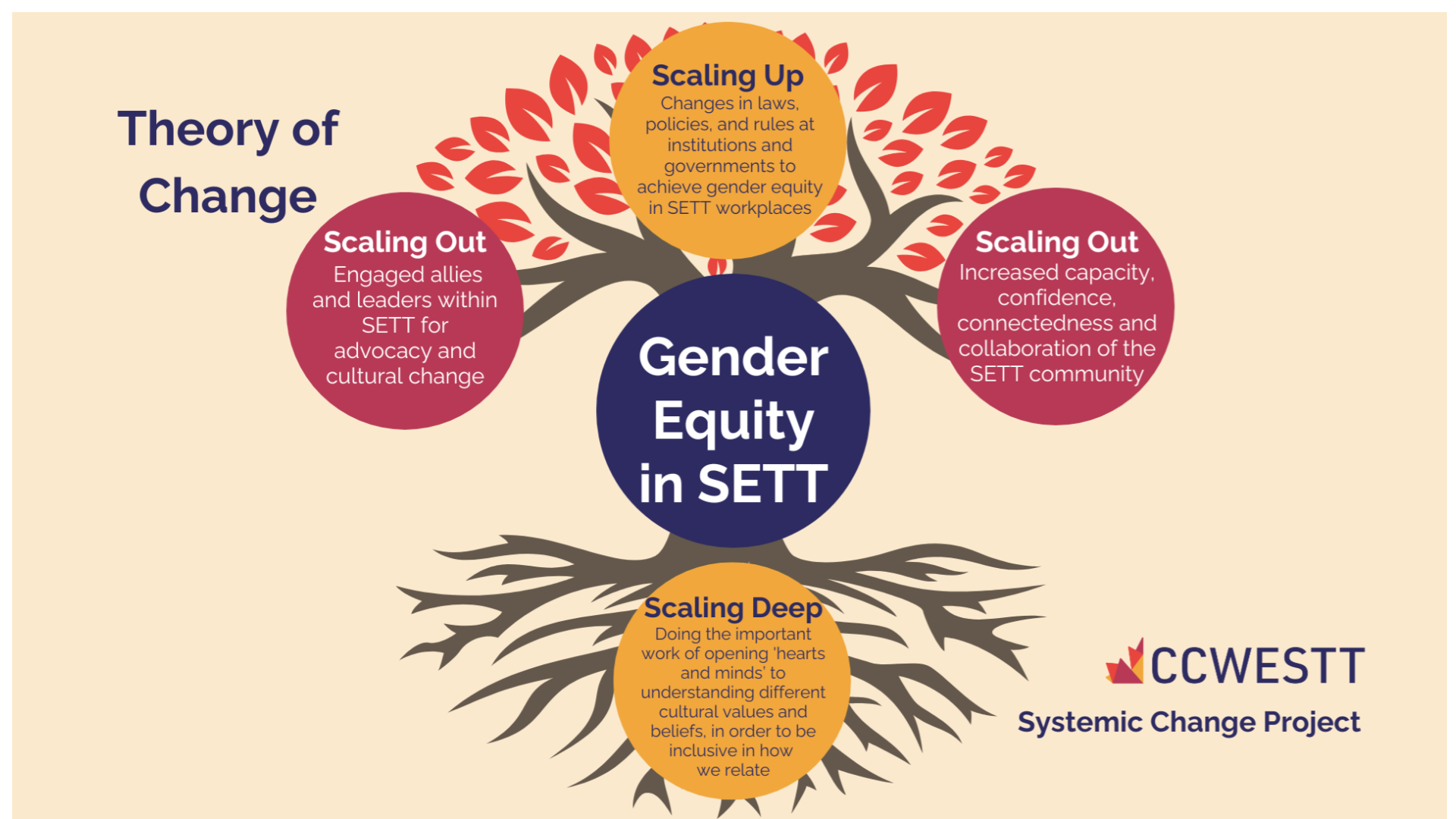Canada’s Innovation Future: Creating a Diverse, Skilled Workforce
Author(s):
Bonnie Douglas
Alicia Bjarnason

Disclaimer: The French version of this text has been auto-translated and has not been approved by the author.
With current geopolitical pressures, Canada must become more economically stable and self-sufficient (CBC, 2025), while addressing inflation pressures and higher living costs (Ipsos, 2024). Canada can achieve economic stability, growth and innovation by investing in a robust science, engineering, trades and technology (SETT) workforce. With significant labour skills gaps that need to be addressed, it is imperative that Canada invests in its education systems to train current and future workers, as well as support industries and infrastructure projects that rely on a skilled workforce. It is also crucial that this investment is done with an intersectional lens, to support all Canadians, in all their diversity, for economic prosperity and innovation.
The current reality is that Canada’s SETT workforce does not reflect the level of diversity of working Canadians. With women and gender-diverse people making up more than 50% of the population, their underrepresentation in SETT must be remedied. To truly ensure a diverse and skilled workforce, barriers such as access to affordable and flexible childcare, care leave, flexible schedules, pay equity, and gender-based violence (GBV) at work, must be removed for women, Indigenous peoples, new Canadians, 2SLGBTQIA+, and people with disabilities.
What actions are needed to create Canada’s diverse, skilled workforce?
- The Government needs to structure the cabinet and allocate an appropriate budget to address gender equality issues in the workplace successfully.
- Government(s), academia and industry need to collaborate to create and maintain a highly qualified SETT workforce, with affordable education, training, and access to a strong job-training ecosystem, particularly for those with established barriers for underrepresented groups.
- Government, academia and industry need to work with all Canadian jurisdictions to ensure our skilled workers have safe work environments, including psychologically safe spaces free of gender-based violence and harassment.
- Individuals and organizations need to take action as allies, champions, and advocates to change mindsets, attitudes, and behaviours in the workplace so that everyone can thrive.
Creating a SETT Workforce for Innovation
Canada will not reach its economic and innovation potential without an educated, knowledgeable, and skilled workforce in SETT. Canada’s publicly funded institutions have limited capacity and funding to educate the current and future workforce (Universities Canada, 2024).Insufficient funding exists for apprenticeships and other hands-on training programs, limiting opportunities for new workers to gain essential experience (Skills Council of Canada, 2024).
Creating Safer Workplaces: Addressing Gender-based Violence and Harassment
The SETT workforce cannot reach its potential for innovation and growth without safe working environments, free from gender-based violence that affects retention and productivity. Women report greater exposure to gender harassment and bullying in the workplace, and a relationship exists between job satisfaction and gender-based workplace issues, stress, and mental health. (SSHRC/WAGE, 2023).
Investing in World-Class Research and Innovation
After decades of stagnating investment, Canada’s health research and innovation ecosystem is woefully underfunded. This limits our ability to generate innovative health solutions, respond to future health emergencies, and retain a robust workforce (Research Canada, 2024). Renewed commitment and investment can attract diverse talent into the research ecosystem, driving innovation.
Engineering Sustainable Solutions
Strong job opportunities for engineers will help build infrastructure, create solutions, and drive innovation. When engineers are successful, we all are (Randstad, 2023). By 2028, Canada is expected to face a shortfall of over 100,000 skilled technical workers, particularly in engineering (Prolink, 2024). This is an ageing workforce, and Canadian institutions cannot educate future workers without financial support.
Constructing Diverse Employment Opportunities
The retirement of 700,000 of Canada’s 4 million skilled tradespeople by 2028 (RBC, 2021) creates the opportunity for Canada to increase the participation rate of underrepresented groups. In 2023, women accounted for just 5% of the on-site construction workforce; in 2021, Indigenous Peoples accounted for 5.1% of Canada’s construction labour force; and in 2022, newcomers comprised about 19% of the total construction labour force, compared to newcomers making up 27% of the overall labour force (Buildforce Canada, 2024).
Advancing the Digital Economy
Canada’s digital economy is expected to employ 2.26 million digitally skilled workers by 2025, accounting for approximately 11% of all employment, triggering a demand for an additional 250,000 jobs (MRO, 2024). Canada will only meet its economic potential by educating the workforce with much-needed technology and AI skills to participate in the digital economy fully, and by establishing robust legislative frameworks to prevent precarious employment.
Innovation Needs People
Successfully advancing Canada’s economic future requires all hands on deck! Gaps persist between intentions and reality, preventing all people, including those in SETT, from reaching their full potential. CCWESTT is a national coalition that envisions a strong economic future where all Canadians can be integral to a skilled workforce. CCWESTT is a social innovator, advocating for meaningful change through a systems change approach of scaling up, out, and deep. Scaling Up involves changes to laws, policies, and rules within institutions, organizations, and government to achieve gender equality in SETT workplaces. Scaling Out increases capacity, connections and collaboration, while engaging allies and leaders. Scaling Deep is essential to systems change – to open hearts and minds – to understand different cultural values and beliefs, and to change behaviours to become more inclusive. Each pathway is crucial for achieving meaningful change across the SETT ecosystem to attain transformative, sustainable outcomes—we cannot have innovation and economic success without people!

Your Commitment to Change, Growth and Innovation
Bold new ideas are needed to ignite change. How can you advance Canada’s skilled workforce in SETT to drive economic growth, productivity and prosperity? What changes are needed in both societal culture and policy for people to reach their full potential in SETT and beyond?
About CCWESTT
For over 30 years, the Canadian Coalition of Women in Engineering, Science, Trades and Technology (CCWESTT) has advocated for a diverse, inclusive Canadian SETT workforce. Collectively supporting over 500,000 people in our network, CCWESTT builds alliances and partnerships, acts as a resource hub, and advocates with a strong, unified voice.
More on the Author(s)
Bonnie Douglas
Canadian Coalition of Women in Engineering, Science, Trades and Technology (CCWESTT)
Executive Director
Alicia Bjarnason
Canadian Coalition of Women in Engineering, Science, Trades and Technology (CCWESTT)
Research and Strategic Lead

